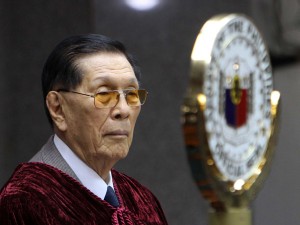NFA permits used to smuggle rice, Senate finds
Senate President Juan Ponce Enrile has expressed concern over the unscrupulous use of the National Food Authority’s (NFA) import permits to provide legal cover for smuggled rice that find their way to the country’s ports.
Enrile and Senator Francis Pangilinan, chairman of the Senate committee on agriculture, raised the issue with the NFA representative during a hearing on Wednesday on the P450-million worth of Indian rice that were allegedly smuggled through the Subic Bay Freeport Zone.
The inquiry into the shipment has uncovered a modus operandi of smugglers in which licensed NFA importers provide the needed documents to legitimize the entry of smuggled rice, such as in the case of the Subic shipment.
It was also tried in a foiled attempt to smuggle more than P100-million worth of Vietnamese rice in Albay early this month.
“We’ve seen this already in the case of the Indian rice [in Subic]. These import permits are being peddled around,” Enrile said.
Safeguards needed
The senator said that while he had confidence in the leadership of Customs Commissioner Rufino Biazon and NFA Administrator Lito Banayo, the process and documentation authorizing the importation of rice should have more safeguards.
He asked NFA assistant administrator Jose Cordero at the hearing, whether the import documents of the NFA were printed on accountable forms. The answer was “no”.
But Cordero said each licensed rice importer has an allowed volume for importation which is reduced everytime the trader seeks a memorandum of undertaking from the NFA to cover a shipment of rice.
While he was not saying that these import permits were being recycled, Enrile said it was not far-fetched that that is exactly what was happening.
“It’s import control scandal all over again. Many people have become wealthy peddling documents,” said Enrile who served as customs commissioner early in the 20-year rule of the late dictator Ferdinand Marcos.
Pangilinan questioned Cordero if the rice seized in Albay may be given authority for release if a licensed NFA importer were to present the NFA with a request for a memorandum of undertaking.
Meant for Indonesia
Cordero said the documents have to be submitted before the arrival of the rice shipment.
“But that’s not what happened with Amira,” Pangilinan pointed out, referring to the Indian rice shipment at the Subic port that was covered by import documents from a licensed NFA importer.
The import documents have since been withdrawn and the P450-million Indian rice shipment has been seized by authorities.
The Indian rice, supplied by New Delhi-based rice exporter Amira Foods, was meant for Indonesia but was rejected by Indonesian port authorities. The shipment found its way to the Subic Bay Freeport where it was seized by the Bureau of Customs from a warehouse operated by a port locator.
Vietnam rice
Biazon told the committee that NFA documents were also presented to cover the shipment of more than 90,000 bags of rice from Vietnam in the Albay case earlier this month.
However, the customs collector deemed the documents to be insufficient, thus foiling the smuggling attempt, he said.
Meanwhile, another player in the rice trade was ordered to show cause why he should not be cited for contempt after a lawyer that notarized his import papers testified that the documents were indeed his in yet another case involving a shipment of Vietnamese rice.
Jan Dexter Marfil, president and CEO of Masagana Import and Export, in a previous hearing denied any involvement in the shipment of 90 container vans of Vietnamese rice in Subic last July.
The shipment was falsely declared as containing construction materials.

